Like many good stories, Apple TV+’s new historical drama “Chief of War” begins with an ancient prophecy: “A Star with a Feathered Cape will signal the rise of a great King, who will unite the kingdoms and end the age of war.” Taking place in the late 18th century, when the land that is presently called the Hawaiian Islands was untouched, the series focuses on four kingdoms that stood alone: the Kingdom of O’ahu, the Kingdom of Maui, the Kingdom of Kaua’i, and the Kingdom of Hawai’i. At the center of these islands is Kaʻiana (Jason Momoa), a warrior who, initially from Maui, sought refuge in Kaua’i, and resides there with his two brothers. They’ve cultivated a languid life, hunting sharks and finding love, wildly different than the existence they previously lived.
This peace is threatened when a horn blows past the water’s shores, signaling the presence of a ship from Maui, and the powerful King Kahekili (Temuera Morrison), who is also Kaʻiana’s uncle. He brings news that the seers of Maui have foreseen a great threat that will enslave their people under the rule of O’Ahu, and with an army larger than theirs, they need the help of Kaʻiana to stop this invasion. Kahekili believes that this impending war could usher in the ancient prophecy their people have been awaiting, and sees himself as the potential king to unite each kingdom. Seeing his nephew has built a life for himself away from war, there is only one route he sees fit to take to convince him.
“The Prophecy does not foretell the rise of a king. It predicts the birth of a moment.” With this declaration from his uncle, Kaʻiana takes up arms and proposes that they invade O’ahu first before the kingdom can even strike Maui. It quickly becomes apparent, however, that perhaps these seers were incorrect, with the king of O’ahu being no older than a child, and Kahekili’s righteousness festering within him right before the eyes of his family. In an attempt to ignite the prophecy himself, the king seeks to use his nephew’s prowess in battle to usher in the rise of their people and the desecration of others.
It’s here that the series raises a question that lays the groundwork for the series: Are our decisions truly our own? Or are they dictated by unseen gods and men and women we hold close? At the heart of these questions is expertly written dialogue that has a knack for disarming you with each declaration, affirmation, and secret uttered from these characters’ mouths. Usually, a series like this would eventually abandon dialogue for extended action sequences. While those do exist here, the show never strays far from simply capturing two people speaking to one another. Not since the early seasons of “Game of Thrones” has writing ever been so thrilling to listen to and consume, only recently rivaled by “Interview with the Vampire.”
Conversations are rich and layered, with a history largely unknown to viewers, bringing forth inflections of the past and future with each passing word. They’re delivered by each actor in the series with a fierceness that gives a heady weight to even the simplest lines. While the show boasts an engaging ensemble cast, two performers stand out among the many, delivering revelatory performances. First is Luciane Buchanan as Kaʻahumanu, who becomes intertwined with Kaʻiana’s story when she helps his family to safety after Kahekili’s men attack them. A priestess tells her that she will “break this world,” ushering in a path of destruction, which hangs heavy on her mind throughout the series. The second is Brandon Finn, who plays Prince Kūpule, the son of Kahekili. As he slowly becomes wary of his father’s growing madness, Finn shines as a man torn between duty, morality, and even his ambitions.

Like the performers that grace the screen, the series is crafted with an overwhelming perspective of wonder and richness. From its opening minutes to its cataclysmic finish, the production value is vast. Gorgeous exterior shots show us mountains, water, and a sky glittering with stars, shaping this show into one of the most beautifully shot series of the decade. The lighting is especially phenomenal, with green trees and brush gleaming under the sun, captured by the camera with a heavenly light. In an era where film and television become increasingly visually dull each year, “Chief of War” stands out among the colorless projects that dominate our cultural landscape.
A feat of spectacle and rich character work, the series does sag a bit in the middle before closing out with a finale that can’t go unmissed. In a world where historical accounts often leave the people who experienced these histories out of the fold, it boldly demands the eyes of an audience that is growing more apathetic with each passing year. Unwilling to abandon its meditative story for loud action sequences or gaudy performances, the series takes time in a landscape that feels the need to rush through these tales. “Chief of War” forces its audience to reckon with its languid storytelling process and the histories it teaches, demanding to be seen in a genre that outsiders often dominate.
All episodes were screened for review. Now on Apple TV+.
